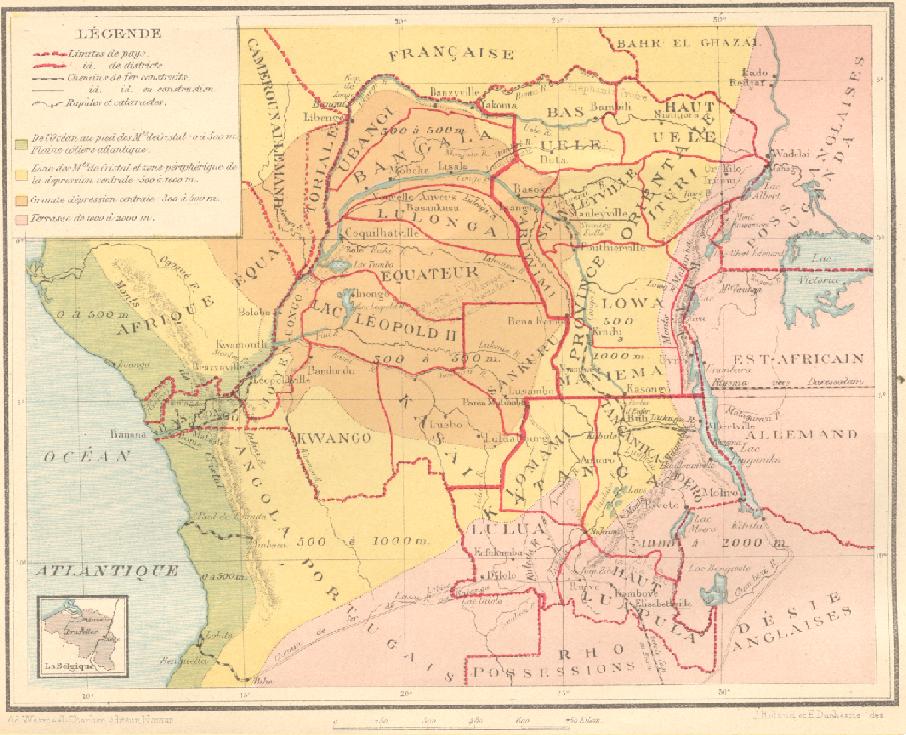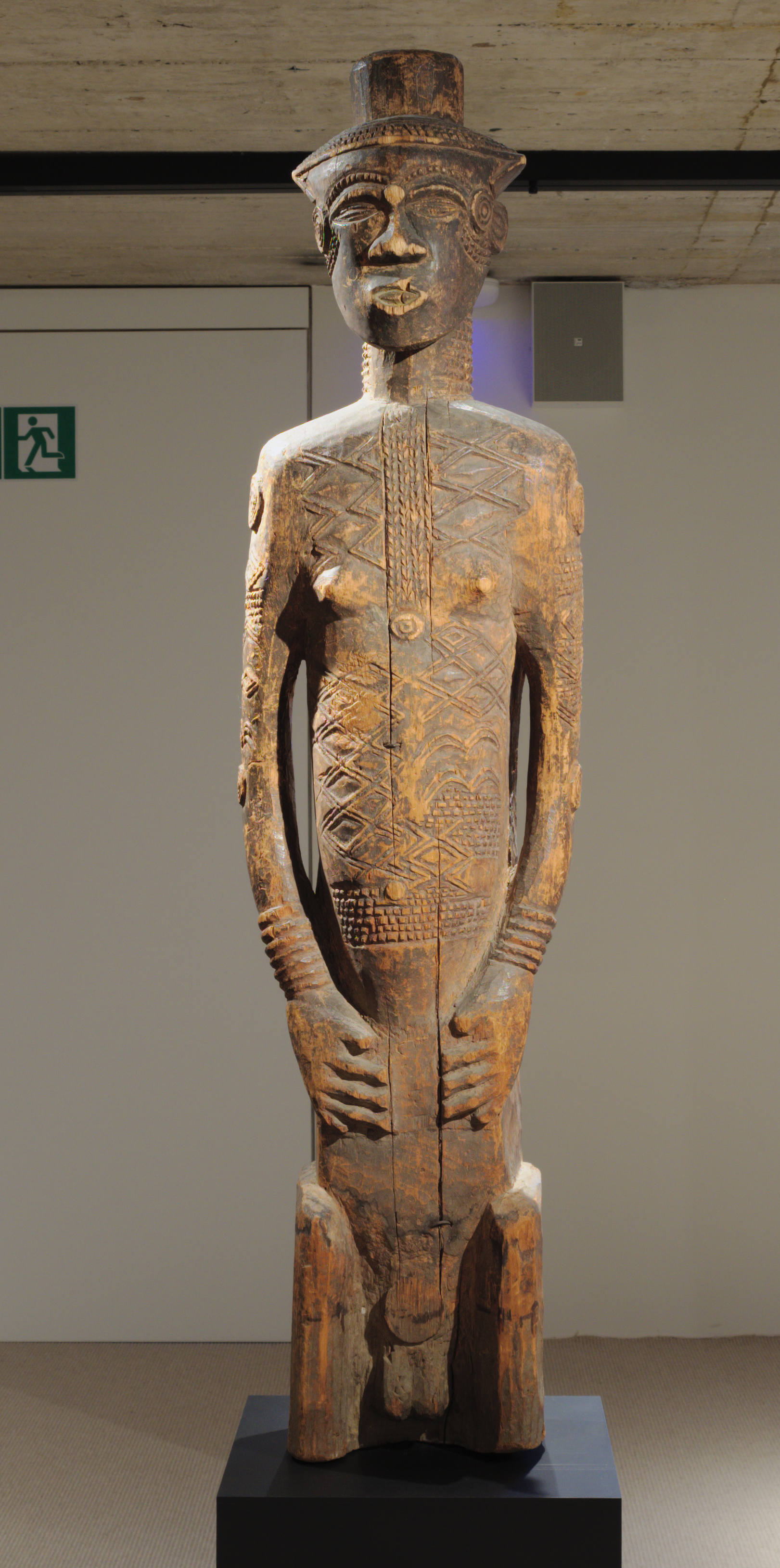|
Joseph Beernaert
Joseph-Edouard-Louis Beernaert (21 April 1883 – 1950) was a Belgian soldier who reached the rank of Lieutenant-General. He was governor of the province of Congo-Kasaï in the Belgian Congo from 1925 to 1929. Early career (1883–1929) Joseph Beernaert was born on 21 April 1883. He was attached to the Ministry of Colonies in 1909. He made many trips to the Belgian Congo during his term of office. He was commissioner general, assistant to the governor of the province of Congo-Kasaï from 1925 to 1929. From 1928 he was secretary general, assistant to the governor general of the colony. Governor of Congo-Kasaï (1929–1933) Beernaert replaced Alphonse Engels as governor and deputy governor-general of Congo-Kasaï on 19 June 1929. His headquarters were at Léopoldville. In 1931 there was an economic crisis in the Belgian Congo triggered by problems in Belgium, the primary market, and an overvalued currency, leading to reduced exports. The head tax (''impôt indigène'') increas ... [...More Info...] [...Related Items...] OR: [Wikipedia] [Google] [Baidu] |
List Of Governors Of Kasaï (former Province)
This list of governors of Kasaï includes governors or equivalent officeholders of the Congo-Kasaï/Kongo-Kasaï province established in the Belgian Congo in 1918. On 1 October 1933 it was split into the Lusambo and Léopoldville provinces. Lusambo included the Kasaï and Sankuru districts of Congo-Kasaï and parts of the Léopold II District (Équateur) and Lomami District (Katanga). On 27 May 1947 Lusambo was renamed Kasaï, which became an autonomous province of the Congo republic on 30 June 1960. On 14 August 1962 Kasaï was divided into five new provinces: Lomami, Luluabourg, Sankuru, Sud-Kasaï and Unité Kasaïenne. On 25 April 1966 Luluabourg and Unité Kasaïenne were united to form Kasaï-Occidental, while Lomami, Sankuru, and Sud-Kasaï were united in the new province of Kasaï-Oriental. Kasaï-Occidental was split in 2015 into the Kasaï-Central and Kasaï provinces. Congo-Kasaï (1922–1932) The governors (or equivalent) of Congo-Kasaï Province were: ... [...More Info...] [...Related Items...] OR: [Wikipedia] [Google] [Baidu] |
Alphonse Engels
Alphonse Engels (1880–1962), or A.L.R. Engels, was deputy governor-general of Congo-Kasaï province in the Belgian Congo from 1924 to 1929. Life Alphonse Engels was born in 1880. He became a soldier by trade. He replaced Georges Moulaert as deputy governor-general of Équateur in 1919. On 25 October 1921 he was succeeded as governor by Charles Duchesne. Engels was deputy governor-general of Congo-Kasaï province in the Belgian Congo from 1924 to 1929. He replaced Léon Guilain Bureau (1869–1944) as deputy governor-general of Congo-Kasaï in 1922. In 1925 he was made governor and deputy governor-general of the province. He left office on 19 June 1929, replaced by Joseph Beernaert. In September 1930 Engels was a member of a formal commission of inquiry into the conditions of laborers in the colony. Other members included Colonel Alexis Bertrand and Pierre Ryckmans, who had investigated the Kilo-Moto gold mines and the ''Huileries du Congo Belge'' (HCB). Later he became ... [...More Info...] [...Related Items...] OR: [Wikipedia] [Google] [Baidu] |
Paul Ermens
Paul-Charles Ermens (June 8, 1884 – November 1, 1957) was a senior Force Publique officer, Vice-governor general of the Belgian Congo and Commander of the Force Publique. His most famous post was when he served as the commander of the Force Publique in World War II. Career He graduated in 1903 from the Belgian Royal Military Academy and joined the Royal grenadiers regiment. In 1914 he was an officer in the Force Publique, on August 4, 1914, he was promoted to Captain-commandant. He commanded the 3rd battalion of the Force Publique in the East African Campaign (World War I), for his service he was awarded the title of knight in the Order of the African Star. In 1918 he became Commander of the Force Publique in East Africa. In 1925 he became General and was appointed as commander of the Force Publique. In 1930 he didn't agree with the plans to reform the Force Publique and returned to Belgium. In 1932 he was appointed as vice-governor general of the Belgian Congo and governor ... [...More Info...] [...Related Items...] OR: [Wikipedia] [Google] [Baidu] |
Congo-Kasaï
Congo-Kasaï was one of the four large provinces of the Belgian Congo defined in 1914. It was formally established in 1919, and in 1933 was divided into the new provinces of Léopoldville and Lusambo. Location Congo-Kasaï was named after the Kasai River, a major left tributary of the Congo River that provides access to the region. By 1910 a factory of the Kasai Company had been established near Misumba, which had about two thousand inhabitants. The company had made successful trial rubber plantations. The company also bought rubber and ivory from the local people, some of whom used it to buy liquor from the Portuguese territory (Angola). Congo-Kasaï had five districts: the urban district of Léopoldville, capital of the colony, and the districts (from west to east) of Bas-Congo, Kwango, Kasaï and Sankuru. The '' Huileries du Congo Belge'' company had two zones (or circles) of exploitation in the province based on Brabanta and Leverville, of which Leverville was the most ... [...More Info...] [...Related Items...] OR: [Wikipedia] [Google] [Baidu] |
Belgian Congo
The Belgian Congo (french: Congo belge, ; nl, Belgisch-Congo) was a Belgian colony in Central Africa from 1908 until independence in 1960. The former colony adopted its present name, the Democratic Republic of the Congo (DRC), in 1964. Colonial rule in the Congo began in the late 19th century. King Leopold II of the Belgians attempted to persuade the Belgian government to support colonial expansion around the then-largely unexploited Congo Basin. Their ambivalence resulted in Leopold's establishing a colony himself. With support from a number of Western countries, Leopold achieved international recognition of the Congo Free State in 1885. By the turn of the century, the violence used by Free State officials against indigenous Congolese and a ruthless system of economic exploitation led to intense diplomatic pressure on Belgium to take official control of the country, which it did by creating the Belgian Congo in 1908. Belgian rule in the Congo was based on the "colonial tr ... [...More Info...] [...Related Items...] OR: [Wikipedia] [Google] [Baidu] |
Léopoldville
Kinshasa (; ; ln, Kinsásá), formerly Léopoldville ( nl, Leopoldstad), is the capital and largest city of the Democratic Republic of the Congo. Once a site of fishing and trading villages situated along the Congo River, Kinshasa is now one of the world's fastest growing megacities. The city of Kinshasa is also one of the DRC's 26 provinces. Because the administrative boundaries of the city-province cover a vast area, over 90 percent of the city-province's land is rural in nature, and the urban area occupies a small but expanding section on the western side. Kinshasa is Africa's third-largest metropolitan area after Cairo and Lagos. It is also the world's largest nominally Francophone urban area, with French being the language of government, education, media, public services and high-end commerce in the city, while Lingala is used as a ''lingua franca'' in the street. Kinshasa hosted the 14th Francophonie Summit in October 2012. Residents of Kinshasa are known as ''Kinoi ... [...More Info...] [...Related Items...] OR: [Wikipedia] [Google] [Baidu] |
Kwango District
Kwango District (french: District du Kwango, nl, District Kwango) was a district of the Congo Free State, Belgian Congo and the Democratic Republic of the Congo. It went through various changes in extent. It roughly corresponded to the present provinces of Kwilu and Kwango. Congo Free State In 1895 the number of the districts in the Congo Free State was increased to fifteen. The districts now included Kwango District. It had been carved out of the west of the Kasai District. A map of the Congo Free State in 1897 shows the Kwango Oriental district bounded by the Stanley Pool District to the west, the Lualaba Kassai District to the east, and Portuguese possessions (Angola) to the south. The district extended south from the point where the combined Kwango and Kwilu rivers entered the Kasai River, and included the watershed of the Wamba River. The Kwango River formed the border with the Portuguese territory to the west, and the eastern boundary was to the east of the Kwilu River. ... [...More Info...] [...Related Items...] OR: [Wikipedia] [Google] [Baidu] |
Force Publique
The ''Force Publique'' (, "Public Force"; nl, Openbare Weermacht) was a gendarmerie and military force in what is now the Democratic Republic of the Congo from 1885 (when the territory was known as the Congo Free State), through the period of Belgian colonial rule (Belgian Congo – 1908 to 1960). The FP was retitled as the Congolese National Army or ANC in July 1960 after independence. Establishment The ''Force Publique'' was initially conceived in 1885 when King Leopold II of the Belgians, who held the Congo Free State as his private property, ordered his Secretary of the Interior to create military and police forces for the State. Soon afterwards, in early 1886, Captain Léon Roger (of the Belgian Army's Carabiniers) was sent to the Congo with orders to establish the force. A few months later, on 17 August, he was promoted to "Commandant of the Force Publique". A number of other Belgian officers and non-commissioned officers were also dispatched to the territory as the nuc ... [...More Info...] [...Related Items...] OR: [Wikipedia] [Google] [Baidu] |
Mukuku
Mukuku is a village in Kwilu Province of the Democratic Republic of the Congo. Location Mukuku is in Gungu Territory, about southwest of the town of Gungu in Kwilu Province. The Köppen climate classification is Aw : Tropical savanna, wet. Historical note In 1931 there were widespread disturbances in the Kwango District of Congo-Kasaï, which the Ministry of Colonies later attributed to new administrative structures, availability of ''Force Publique The ''Force Publique'' (, "Public Force"; nl, Openbare Weermacht) was a gendarmerie and military force in what is now the Democratic Republic of the Congo from 1885 (when the territory was known as the Congo Free State), through the period of ...'' units and overreaction by administrators. At Mukuku in August 1931 troops killed 56 people in a single encounter. Word of the violence spread, and villagers fled before the columns reached them, leading to optimism among the authorities that the rebellion was calming down. Notes ... [...More Info...] [...Related Items...] OR: [Wikipedia] [Google] [Baidu] |
Dengese People
The Dengese, also known as the Ndengese, are an ethnic group from Democratic Republic of the Congo. They speak Bondengese and Lingala Lingala (Ngala) (Lingala: ''Lingála'') is a Bantu language spoken in the northwest of the Democratic Republic of the Congo, the northern half of the Republic of the Congo, in their capitals, Kinshasa and Brazzaville, and to a lesser degree in .... External links The Dengese of the Democratic Republic of the Congo Ethnic gr ... [...More Info...] [...Related Items...] OR: [Wikipedia] [Google] [Baidu] |
Charles Duchesne
Charles-Marie-Nestor Duchesne (1 September 1881 – 17 November 1945) was a Belgian lawyer and colonial administrator who was governor of Équateur (former province), Équateur Province in the Belgian Congo from 1921 to 1933. Early years Charles-Marie-Nestor Duchesne was born in Molenbeek-Saint-Jean, Belgium, on 1 September 1881. His parents were Nestor Duchesne and Catherine Wenger. He married Rachel Bagot. His father was a horticulturalist, and soon after Charles was born was put in charge of the provincial horticultural school at Huy. Charles studied humanities at the Collège Saint Quirin and studied Law at the public University of Liège. He registered at the Huy bar. Magistrate On 30 October 1907 Duchesne joined the service of the Congo Free State as a provisional magistrate. He embarked at Antwerp on 5 December 1907 and reached Boma, Democratic Republic of the Congo, Boma on 31 December 1907, where he was appointed deputy state prosecutor at the court of first instance. ... [...More Info...] [...Related Items...] OR: [Wikipedia] [Google] [Baidu] |


